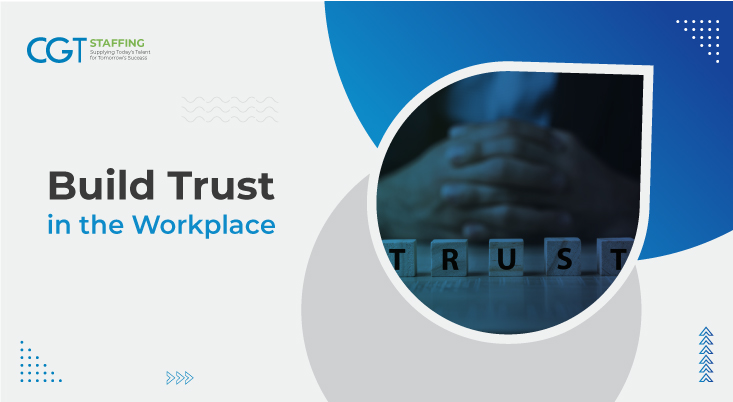Fostering mutual trust between all team members is conducive to the success of any organization. Some may even call it the “secret sauce” of developing a healthy culture over the long term. Managers must be made responsible for building trust in the workplace – they cannot evolve into effective leaders without the ability to manifest trust.
Key decision makers of any organization should emphasize building trust as a foundational stone that can help create a positive work culture and generate results.
Table of Contents
Defining Workplace Trust
It can be difficult to articulate what the term “trust” really means; it often warrants an emotional response rather than a practical one. Most key decision makers at an organization may have a different definition of it than their employees. As such, a baseline discussion of what workplace trust entails, according to each stakeholder, should be the first order of business in any initiative geared towards building trust in the workplace.
Typically, when employees or hiring managers talk about trust, they are referring to the sense of security they feel in an organization. More specifically, the confidence that comes with dealing with someone and understanding their perspective, reactions, and ethos and being understood in kind. This level of credibility doesn’t come overnight; it takes time to develop through the right communication, organizational structure, and policies.
Why Is Building Trust in the Workplace Important?
Deprioritizing or ignoring workplace trust can decrease employee productivity and satisfaction – the two factors that are indirectly proportional to resource turnover. By breaking free of the hindrances of petty politics, toxic work environments, and micromanagement, any workplace can promote a culture of honesty, inclusivity, and mutual respect. In an employee-focused and healthy workplace environment, resources are proud of where they work and are willing to go the extra mile.
A 2017 study shows that employees at high-trust companies reported 74% less stress and 50% greater productivity than employees elsewhere. Accordingly, employers who strive to make their organizations a draw for talented and motivated individuals would do well to invest time and resources into harnessing a mutually beneficial and trusting relationship with current and prospective employees.
What Are the Ways to Build Trust in the Workplace?
Creating an environment where employees sense that management is operating on their behalf can be a game-changer for creating positive change in the organizational culture. Resources should have confidence that they will be treated fairly, that their employer will review setbacks and offer course correction as necessary, and there won’t be any out rightly negative consequences for non-conformity. The key decision makers of any organization can create a more accepting and high-functioning culture by employing the following ways to build trust in the workplace.
1: Build Long-Term Relationships
Organizations must strive to build workable and progressive relationships with their employees from the outset – from onboarding until their departure. Trust building starts from the hiring process and recruiters should utilize the best talent acquisition strategies in order to cultivate long-term employee-employer relationships. Both stakeholders benefit from such policies and appropriate two-fold strategies are the responsibility of every hiring manager.
Focus on short-term goals may provide a lifeline for an outdated and obsolete organizational culture, however, longevity should be the ultimate goal for mortgage recruiters and hiring managers. Long-term thinking might seem inconvenient but it can necessarily produce lucrative results and directly affect the future of any organization.
2: Make Conscious Efforts
Fulfilling promises and exceeding employee expectations can take time. It takes what might feel like eons for employers to build rapport and gain the trust of their employees. That is why many organizations take help from staffing companies, mostly their local ones like a Pittsburgh staffing agency. This sort of partnership can enable organizations to focus their resources on the maintenance and preservation of their internal and incoming talent. However, the management will still need to be patient as there are bound to be roadblocks. The right decisions can sometimes be the most difficult to implement, effective results are slow to surface, and most employees aren’t looking for instant gratification. Consistent and conscious effort to align behaviors with the core values and goals of the organization is what will ultimately help smooth the path.
3: Ensure Accountability
Key decision makers should ensure that the rules are the same for everyone. Leaders who feel comfortable following in the footsteps of their resources and can validate their concerns and feelings can harness a lot more trust.
Gloating over success stories can dehumanize top decision makers of the organization and can make them seem inaccessible. Ensuring that employees follow their lead will only happen if they see them as human, prone to mistakes, and credible. All stakeholders should be open to an honest dialogue that fosters accountability and promotes a healthy work environment.
Frequently Ask Questions
Why is trust important?
Building trust in the workplace can be the only way to create an honest dialogue, and foster harmony and mutual respect, whilst increasing employee productivity.
Why is trust important in the workplace?
Trust in the workplace can help keep employees motivated and improve overall organizational culture.
How to demonstrate trust in the workplace?
Employers and key decision makers need to delegate responsibilities, leave some room for error, and demonstrate the principles prized by their organization.
